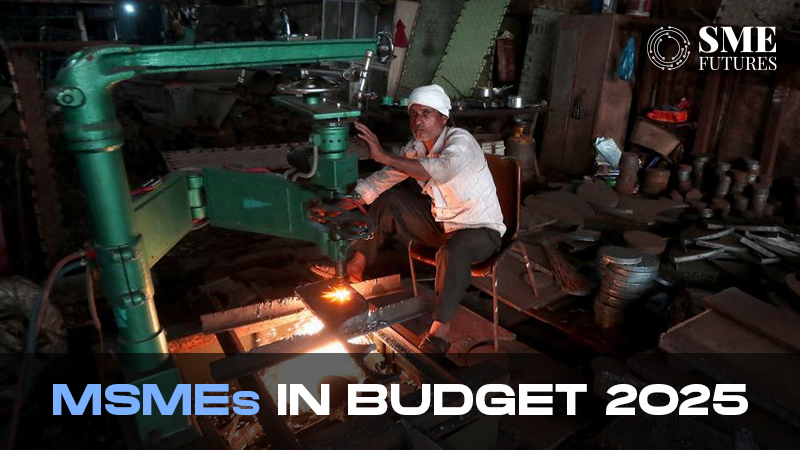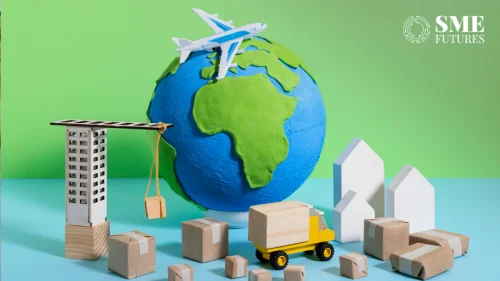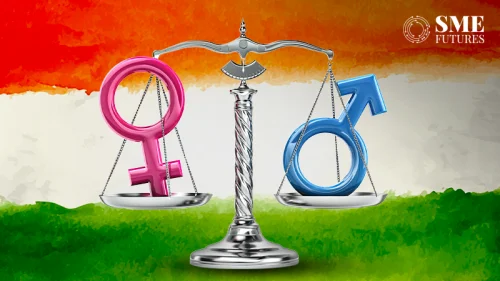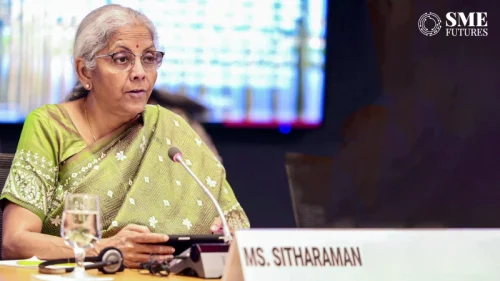India’s MSME sector gets another boost after the recent FY25-26 budget announcement. As Finance Minister Nirmala Sitharaman announced the FY25-26 budget today, all were wondering how the current government will take the commitments to a next level in the new budget. Building on the foundation laid by the FY24-25 budget, this year’s budget further strengthens the MSME sector by focusing on enhanced credit access, skilling initiatives, and employment generation. The FM was also vocal in addressing challenges like technology adoption, global competitiveness, and inclusive growth.
Overview of MSME focus in FY24-25 budget
The FY24-25 budget prioritised MSMEs through the following key measures:
Credit Access: Mudra loan limits were doubled from Rs 10 lakh to Rs 20 lakh under the ‘Tarun’ category.
Employment Generation: EPFO contributions of employers were reimbursed up to Rs 3,000 per month for two years for new hires, aiming to create 50 lakh jobs.
Skilling: 20 lakh youth were targeted for skilling over five years, with 1,000 ITIs upgraded to enhance employability.
Manufacturing Support: A Credit Guarantee Scheme was introduced for MSMEs in the manufacturing sector, alongside the development of 12 industrial parks under the National Industrial Corridor Development Programme.
Internship opportunities: A scheme was launched to provide 1 crore youth with internships in 500 top companies over five years.
These measures aimed to address challenges like access to credit, formal job creation, and skill development while fostering innovation and competitiveness in the sector.
Key MSME announcements in FY25-26 budget
The FY25-26 budget, presented by Finance Minister Nirmala Sitharaman, has introduced several transformative measures for MSMEs:
Credit access: The credit guarantee cover has been enhanced from Rs 5 crore to Rs 10 crore, unlocking Rs 1.5 lakh crore in additional credit over the next five years.
Delphin Varghese, Co-founder & Chief Business Officer, AdCounty Media, said, “Enhancing the credit guarantee cover from Rs 5 crore to Rs 10 crore would open up additional credit of Rs 1.5 lakh crore in five years to ensure better financial access for micro-enterprises.”
Investment and turnover limits: The investment and turnover limits for MSMEs have been increased by 2.5X and 2X, respectively, enabling businesses to scale without losing benefits.
Kishor Fogla, Founder of Yellow Slice, noted, “The government is committed to the sector’s growth by increasing both investment and turnover limits for MSME’S to 2.5 and 2.5 times respectively. This change will enable many enterprises to upgrade their technology and scale operations without losing the benefits that come with MSME status.”
Fund of funds: A new Rs 10,000 crore infusion into the Fund of Funds will strengthen capital access for innovation and growth.
“The increase in credit guarantee for startups from Rs 10 crore to Rs 20 crore is a much needed demand that has been finally accepted. This will not only enable startups to have access to debt capital it will also help them scale faster with less equity dilution. Hence, it will lead to a virtuous cycle of higher top line, less equity dilution, better valuation and better fundraise,” pointed out Mayuresh Raut, Managing Partner, Seafund.
Term loans: Term loans up to Rs 2 crore will enhance credit availability, supporting expansion and modernisation.
Ridhima Kansal, Director, Rosemoore, added, “With Rs 10 crore coverage now possible, these businesses can finally commence proper investment planning geared towards genuine technology upgradation and capacity expansion.”
Comparative analysis
Credit Access
FY24-25: Mudra loan limits doubled to Rs 20 lakh; Credit Guarantee Scheme for manufacturing MSMEs.
FY25-26: Credit guarantee cover increased to Rs 10 crore, unlocking Rs 1.5 lakh crore in additional credit in the next five years. With 10-20 crore to be invested in 27 specific sectors. Also, the government plans to bring out a credit card scheme for the MSMEs, all to bolster startup investments in the country.
Raghunandan Saraf, Founder and CEO, Saraf Furniture, said, “Increasing the credit cover is going to make banks more comfortable and willing to lend to micro enterprises, which may change the lending patterns of smallish businesses completely.”
Employment generation
FY24-25: EPFO reimbursement for 50 lakh jobs; Rs 15,000 wage support for 210 lakh youth.
FY25-26: The investments and limit for classification of all MSMEs will be enhanced to 2.5 per cent. Giving further confidence to companies and generate employment.
Hariom Seth, Founder of Tagglabs, remarked, “This enhanced cap combined with the possibility to provide Rs 1.5 lakh crore additional credit over the next five years will greatly improve the accessibility to working capital for funding-starved smaller businesses, generating more jobs.”
Skilling and training
FY24-25: 20 lakh youth targeted for skilling; 1,000 ITIs upgraded.
FY25-26: Taking ahead the “Make in India initiative”, the government has decided to set up five National Centres of Excellence for skilling and to bridge the gap needed to match global expertise.
Sumit Kumar, Chief Strategy Officer at TeamLease Degree Apprenticeship, highlighted, “The budget also lays out a transformative roadmap for education, skilling, and AI-driven learning, ensuring that India’s workforce is equipped for the evolving demands of the global economy.”
“The establishment of five National Centres of Excellence for Skilling will help bridge the skill gap, increase employability, and prepare youth for emerging industries, while global skilling partnerships will enable Indian talent to access international opportunities, further positioning India as a leading provider of skilled professionals worldwide,” pointed out Kumar.
Manufacturing and industrial growth
FY24-25: 12 industrial parks developed; Rs 1,000 crore venture capital fund for startups.
FY25-26: To further bolster the ‘Atmanirbhar Bharat’ move, the government has proposed ‘National Manufacturing Mission’ to make the plan a reality by 2026.
“Our government will establish a national manufacturing mission that will encompass small, medium, and large industries. This mission will provide policy support, execution roadmaps, and a governance and monitoring framework for both central ministries and states,” said FM Nirmala Sitharaman.
“The launch of a new scheme to position India as a global hub for sustainable toy manufacturing under the Made in India brand will further enhance domestic manufacturing capabilities and encourage investment in high-quality, sustainable production practices. These measures are expected to invigorate private sector investment, enhance the ease of doing business, and accelerate India’s transition into a leading global manufacturing destination,” said Kumar.
What did the experts had to say?
Experts have lauded the FY25-26 budget for its focus on MSMEs:
Jyoti Prakash Gadia, Managing Director at Resurgent India, said, “The announcement of 10 lakh credit cards with a limit of Rs 5 lakh each for micro-enterprises is a big booster for availability of much-needed finance for the enterprises registered in the Udyam portal. This is expected to be a game changer.”
Ridhima Kansal, Director, Rosemoore, added, “The increase in the credit guarantee marks a keen insight into the ground-level issues that micro-enterprises grapple with.”
Gaurav Shisodia, Vice President, Payoneer India, emphasised the budget’s impact on exports: “The Union Budget 2025 sets the stage for India’s export growth. With the right policies, India can expand its global trade and drive innovation. Key measures like tariff rationalisation, duty exemptions, and simpler export compliance will help Indian businesses stay competitive. Public-private initiatives, like e-commerce export hubs, have already made an impact, and continued support for SMBs will be essential.”
“As India strengthens its position in global trade, the demand for sustainable packaging solutions is poised to rise. Ensuring that MSMEs can meet international environmental standards through green innovation will be key to unlocking new export opportunities and reinforcing India’s leadership in responsible manufacturing. We are optimistic that these reforms will accelerate sustainable industrial growth, ensuring that Indian MSMEs continue to lead in quality manufacturing, employment generation, and economic resilience,” said Jay Deepak Shah, CEO & MD, Jay Wood Industry on the government’s promising stance on the manufacturing sector.
Overall, the FY25-26 budget, presented by Finance Minister Nirmala Sitharaman, builds on the foundation laid by FY24-25, which focused on credit access, job creation, and skilling for MSMEs. With enhanced credit guarantees, increased investment limits, and a Rs 10,000 crore Fund of Funds, the government aims to empower MSMEs to scale, innovate, and compete globally.
As the sector navigates challenges like global economic uncertainty and supply chain disruptions, these measures are expected to drive inclusive growth and job creation, solidifying India’s position as a global economic powerhouse.
Gaurav Shisodia, Vice President, Payoneer India, noted, “Budget 2025’s focus on MSMEs as the second engine of growth—enhancing investment and turnover limits—is a strong step toward scaling businesses, fostering innovation, and generating employment.”










